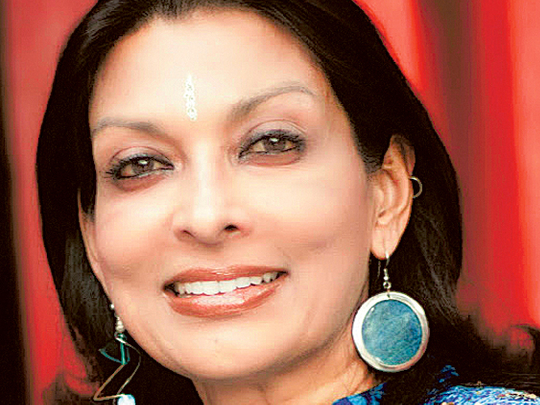
Ahmedabad: Dr Mallika Sarabhai, 60, is a multi-faceted personality celebrated across India for her versatility and creativity as an Indian classical dancer, actor, choreographer, publisher and fearless writer. The Ahmedabad-based artiste runs the Darpana Academy of Performing Arts established by her illustrious parents, the late space scientist Dr Vikram Sarabhai and Indian classical dance exponent Mrinalini Sarabhai, in 1949.
As an outspoken activist for the cause of women, she has portrayed their plight through her powerful thought-provoking dance dramas that are admired everywhere.
For instance, Mallika’s creation ‘Shakti’ was a game changer for performances in India, not only for using multiple forms but for bringing women’s issues centre stage. And also Sita’s Daughters, of which she has done hundreds of performances, in three languages.
Sita’s Daughters is a one-woman show telling the stories of some of India’s bravest women of yesterday and today, women who refused to give in to the pressures around them, women who questioned the world and its values. They are Sitas who refuse ever again to submit to the tests and trials of weak and doubting men.
Mallika introduces us to these women using her own broad range of talents as a dancer and an actress and her own belief that the performing arts can tackle issues of today while entertaining, informing and enlivening us.
Another intense production — I Am Not That Woman by Kishwar Naheed, an Urdu poet from Pakistan known for her pioneering feminist poetry — compares the way women are looked at through the eyes of society.
In this interview with Gulf News, Mallika speaks about woman’s issues that have been sidelined during the election campaign trail that will soon come to an end.
GN: The last phase of elections are in progress and despite the loud noise made by major political parties about women’s empowerment and safety before the polls, not a single party has given any emphasis on this matter? Do you feel women’s issues really don’t matter in this male-dominated political arena?
MS: Women have never figured as a concern for any party in any election even when Indira Gandhi was around. Unless we form a vote bank this will continue
GN: Does it frustrate you that the much trumpeted Power of 49 will be nothing but a return to a status quo situation where women will continue to be powerless, abused and ignored.
MS: Yes and unfortunately the power of 49 will also dissipate in the five years till the next election. It is what we do in the years between elections that will matter in elections, not what we do in the few months leading up to them.
GN: What are your expectations from the new government regarding women’s rights and prevention of genderocide?
MS: I don’t know which government will be formed but not even the combined strength of the Congress and BJP could pass the Reservation Bill
GN: Growing violence against women, especially brutal rapes in big cities, has scared the daylights out of everyone. A sense of fear prevails when women venture out for work or leisure. Why have we come to such a state of affairs? Could you give the reasons for the increasing crime against women?
MS: There are several. More reporting. Slow and loose justice system with very low conviction rates. The sense that machoness and ‘mardangi’ (manhood/masculinity) lies in brutalising women. The commodification of females as bodies through advertising and item numbers. The idolisation of film heroes that treat women like commodities to be ruled.
GN: In what way can the new government tackle this on a war footing and how can women bring about changes?
MS: Sweeping and all encompassing soft and hard changes are needed. A national educational think tank needs to develop sensitisation packages for teachers, parents, educators, executives, legislators. All textbooks need to be made gender bias free. Something like the Representation project must be rolled out to look at print and visual media and bring in punishments. Strong fast visible legislation. Broadcasting positive female role models by actively engaging the best creative minds to make films, books, TV programmes to bombard alternate images. Encourage women’s training and economic programme’s to go beyond sewing classes and beauty parlours.
GN: Do you believe strictest punishment is one of the best ways to curtail violence against women? Despite the tough anti-rape laws being introduced, the violence continues. On the social and cultural sphere, what can be done to make boys and men change their mindset towards women.
MS: A concerted ten-year programme to eulogise men who are sensitive. To start conversations with boys and men at all levels to make them understand that macho is cowardice not strength, that to show their female side is fine. To sensitise parents through TV programmes that are fun.
GN: When you work with rural women, what is the reaction from men or the village panchayat?
MS: Because I am seen as a celebrity I don’t have problems with the men per se. They show a lot of respect. But I always make them feel included in the change rather than alienated
GN: Some of your powerful socially-relevant dance-drama productions have projected and raised women’s issues. Could you elaborate on your works.
MS: I use a lot of mythology as men have used myths to repress. I reinterpret myth from our perspective and this has proved to be a huge positive factor.
GN: What are your next projects after Women with Broken Wings and being involved with One Billion Rising?
I hope to work on special projects to sensitise men.
GN: Do you think it would benefit women if microfinance institutions, catering to low income women borrowers, get a bank licence as one institution recently got one.
MS: Yes certainly. But it is not only this that can free us.
Caption: Mallika Sarabhai, renowned exponent of Indian classical dance, choreographer, writer and activist portrays the plight of women in India through dance, music and drama. (Pic supplied)












